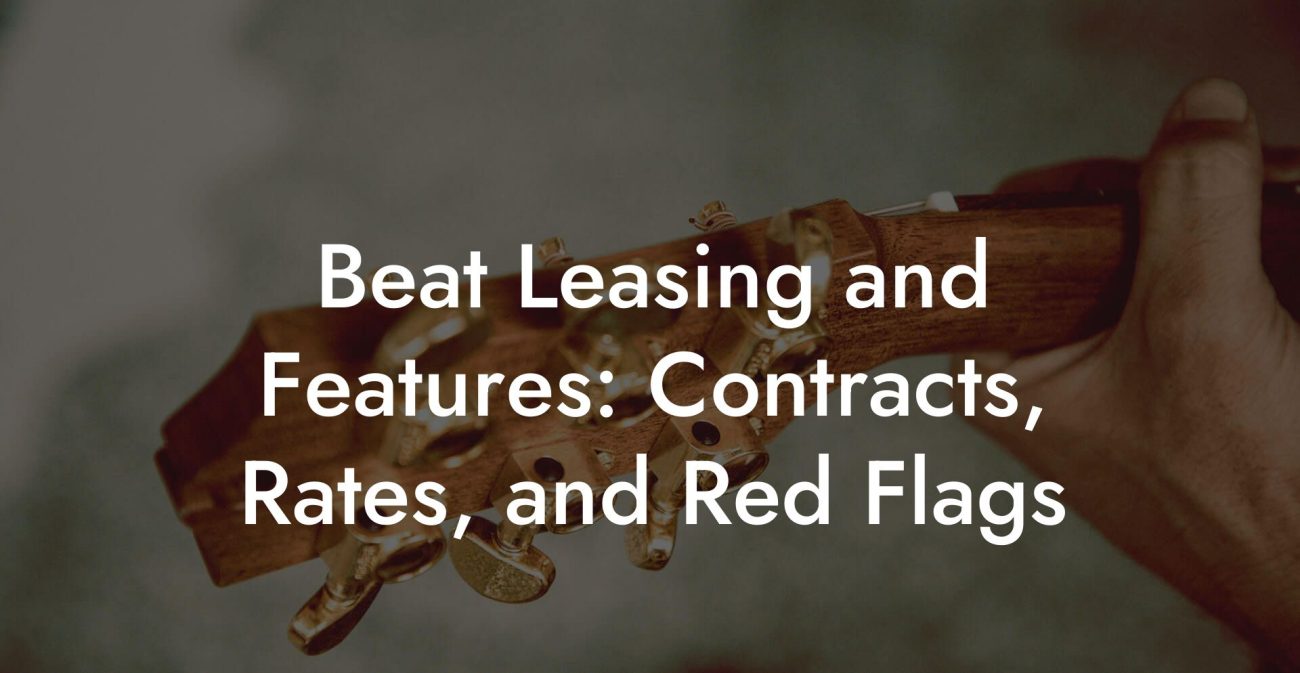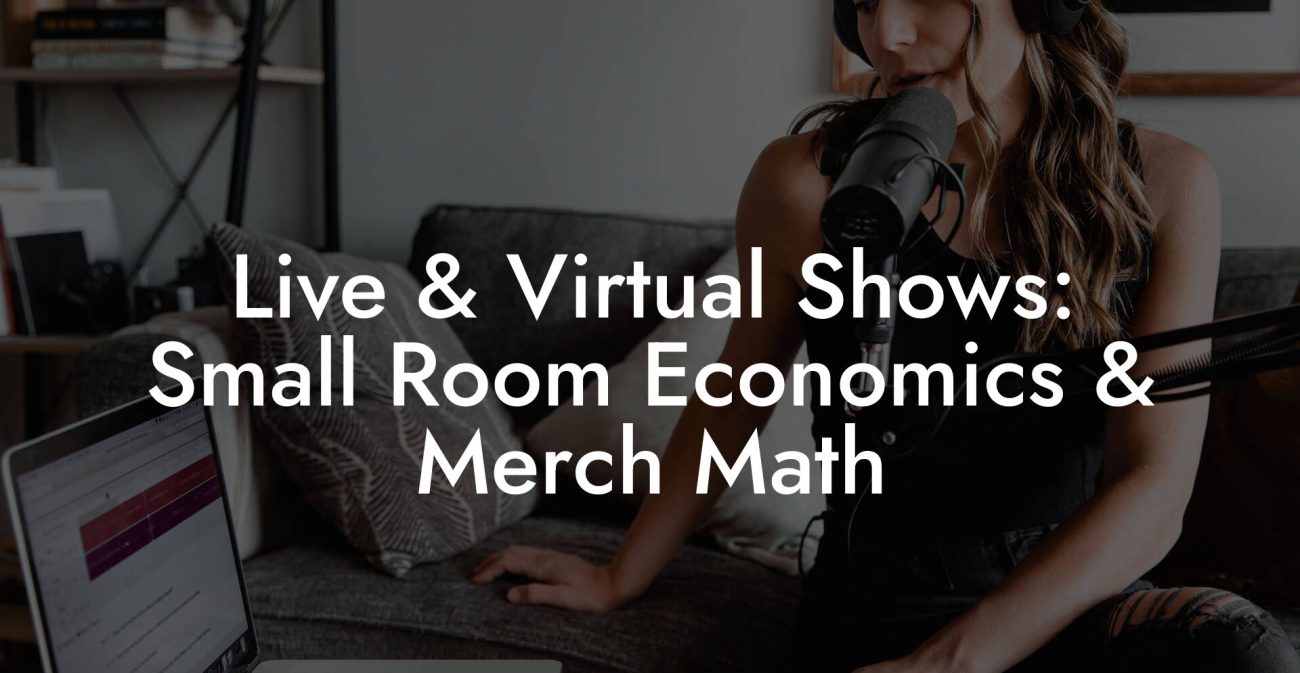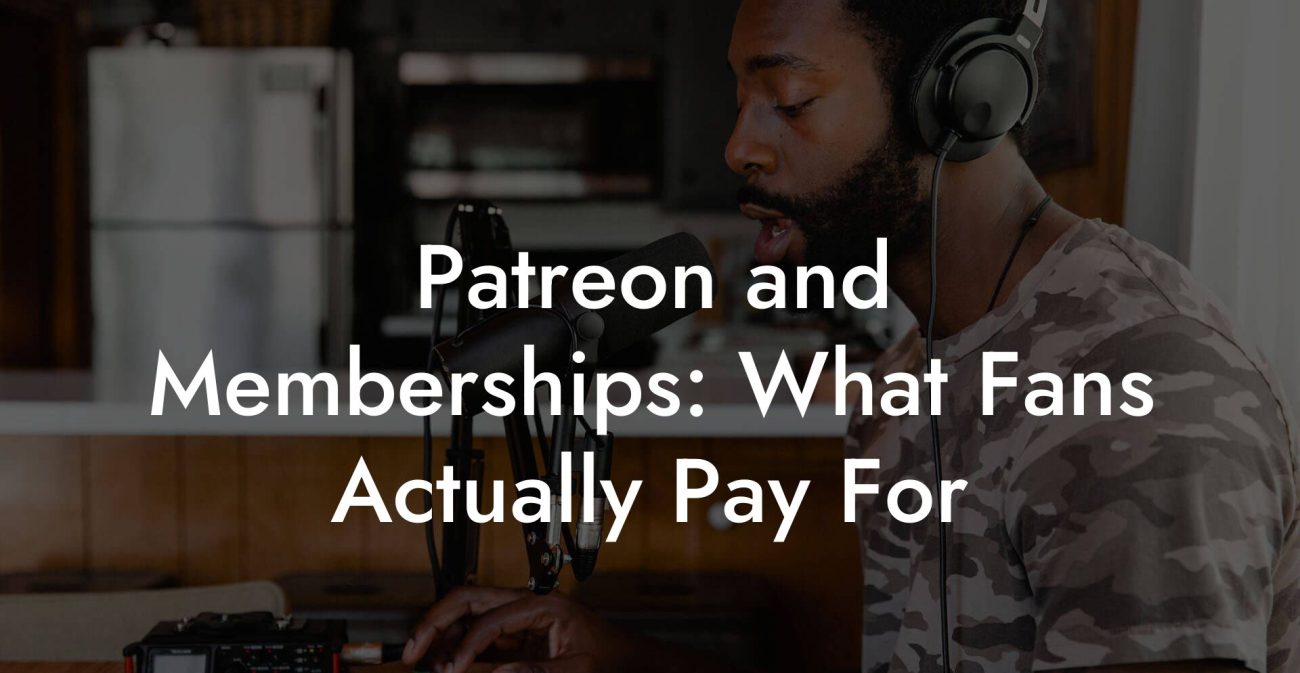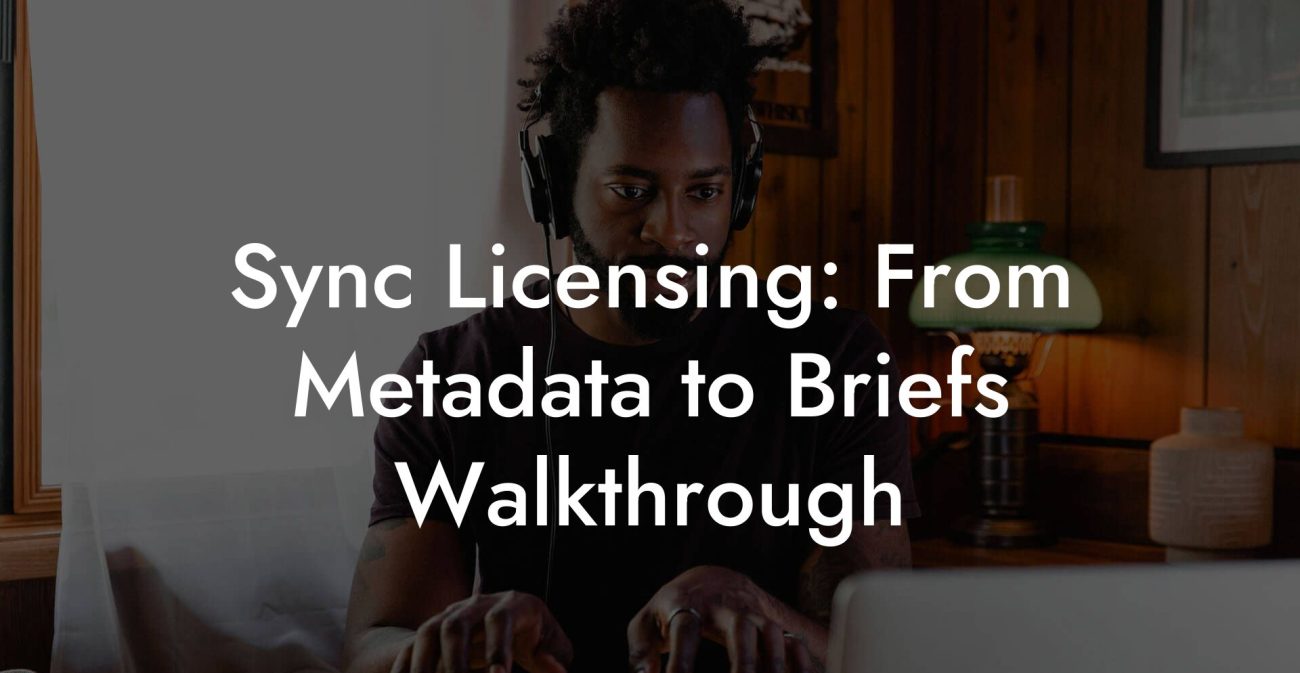Songwriting Advice
12 Revenue Streams for Songwriters Beyond Streaming Pennies
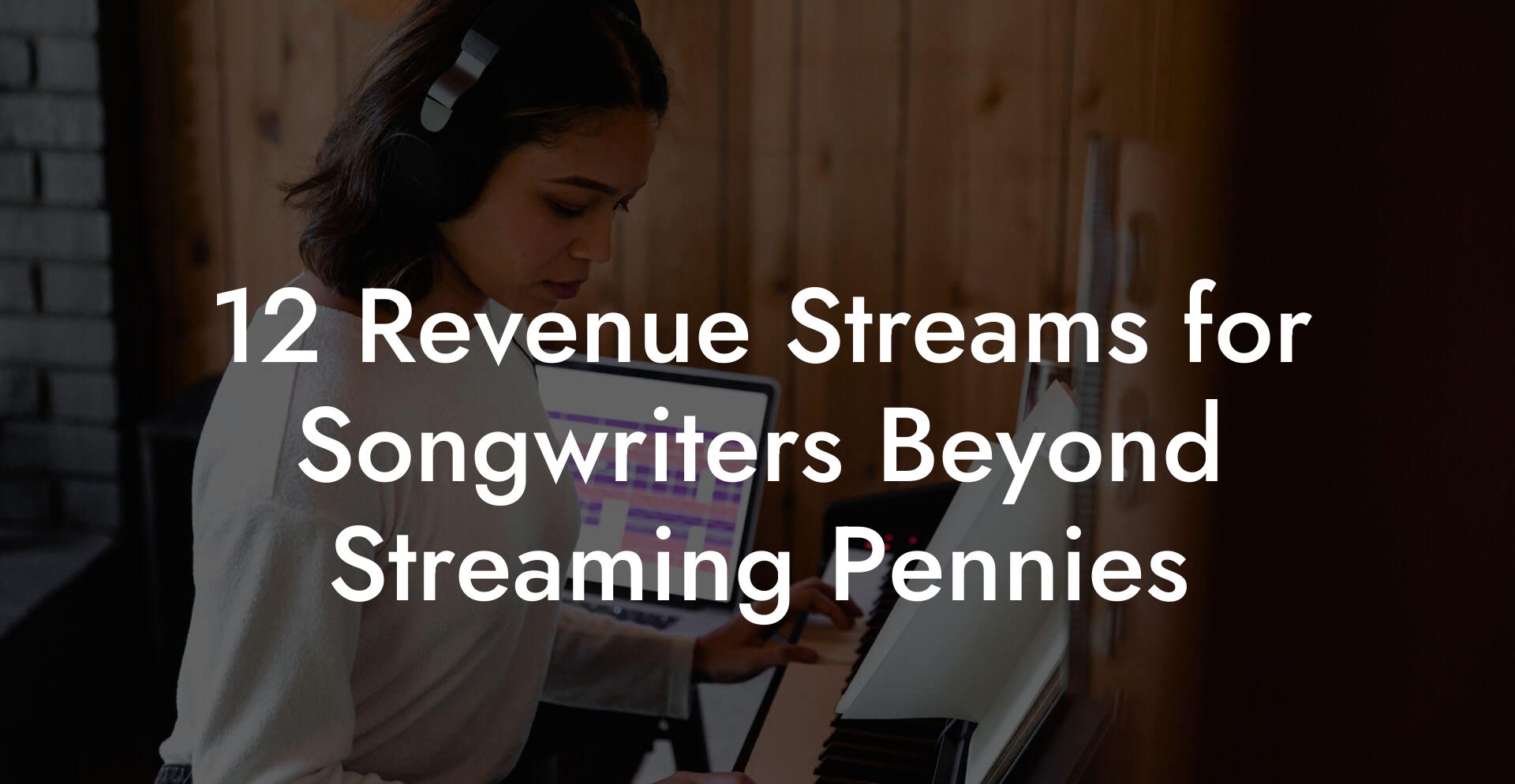
Tired of watching your streaming numbers climb while your bank account laughs at you? Same. Streaming pays something like confetti that smells nice but does not cover rent. This guide is your riotous, practical, no B S manual to turn your songs into real cash from multiple places. We will explain each revenue stream, why it matters, how money travels, real life examples, quick action steps, and common traps to avoid.
Quick Interruption: Ever wondered how huge artists end up fighting for their own songs? The answer is in the fine print. Learn the lines that protect you. Own your masters. Keep royalties. Keep playing shows without moving back in with Mom. Find out more →
Quick Links to Useful Sections
- Why you need multiple revenue streams
- How the money flows in basic terms
- Revenue stream 1 Licensing for TV film and ads
- Why it matters
- Real life scenario
- How to get started
- Pitfalls
- Revenue stream 2 Performance royalties from PROs
- Explain PROs
- Pro tip
- Revenue stream 3 Publishing income and administration
- Publishing split explained
- Revenue stream 4 Mechanical royalties and the Mechanical Licensing Collective
- What is the MLC
- Revenue stream 5 Sync friendly catalog and direct licensing
- What makes a song sync friendly
- Revenue stream 6 Merch and physical product
- Revenue stream 7 Teaching and private lessons
- Revenue stream 8 Session work and production services
- Revenue stream 9 Crowdfunding and fan subscription platforms
- Revenue stream 10 Neighboring rights and international performance collection
- Explain neighboring rights
- Revenue stream 11 Print and licensing for sheet music and lead sheets
- Revenue stream 12 Custom songs jingles and brand work
- How to prioritize which streams to chase
- Practical checklist to stop losing money
- Common legal and money mistakes to avoid
- Examples of realistic earnings
- Real life case studies with short stories
- Case 1 The festival writer
- Case 2 The beat maker turned publisher
- Quick templates and scripts to use now
- Email pitch to a music supervisor
- Simple one page licensing price list
- Tools and resources
- FAQ
This article is written for millennial and Gen Z songwriters who want to stop relying on the streaming lottery. We use plain language, explain acronyms, and give scenarios that actually feel like your life. Ready to make your art pay the bills and maybe buy nicer cereal? Let us go.
Why you need multiple revenue streams
Imagine one income faucet. Now imagine it gets clogged. That is streaming only. Songwriting income is like a ramen jar. If you stack multiple jars you survive the slow months and enjoy the fast ones. Each revenue stream uses your primary asset which is the song. You do not need a different song for each stream. You need strategy and registration with the right services.
Key terms you will see again and again
- Publishing The right to collect money for a song composition. Think lyrics and notes. Publishing pays when a song is performed, copied, or synchronized. If you own publishing, you collect a big chunk of income.
- Master The recorded version of a song. Master rights pay when the recording is licensed, streamed, or sold.
- Performance royalties Money earned when a song is performed publicly. Public performance includes radio, TV, live shows, clubs, and digital streaming platforms. These are collected by performing rights organizations also called PROs.
- Mechanical royalties Money earned when a song is reproduced. That includes physical copies, downloads, and now interactive streams in some legal systems. Mechanical collection agencies handle this.
- Sync Short for synchronization. Licensing a composition and or a master recording for use in film TV ads games or online videos.
- PRO Performing rights organization. These are companies like ASCAP, BMI, and SESAC in the United States. They collect performance royalties and pay songwriters and publishers.
- Admin publisher A company that manages your publishing rights for a fee or cut. They register songs collect royalties and chase unpaid money on your behalf.
How the money flows in basic terms
When a song is used there are usually two separate things to license. One is the composition which belongs to the songwriter or publisher. The other is the master which belongs to the recording owner often the artist or label. A sync license might require permission and payment for both. Performance royalties from radio are paid to publishers and writers by PROs. Mechanical royalties from sales are paid by labels or distribution services to publishers or mechanical agencies. Keep all registrations up to date or you will leave cash on the table.
Revenue stream 1 Licensing for TV film and ads
Sync licensing pays some of the best one time fees plus ongoing performance royalties when the placement airs. This is the sync that can pay rent for a month or buy you a new synth that smells like victory.
Why it matters
Licenses for commercials sometimes pay in the tens of thousands of dollars for a single track. Film and TV can pay smaller upfronts but deliver performance royalties when the show airs or is streamed. The value is both immediate money and long term payday.
Real life scenario
Your track ends up in a late night show promo. You get a few thousand upfront. Then the same episode airs in multiple countries and your PRO pays you performance checks over the next two years. You buy groceries and a new mic stand that does not wobble like your decisions.
How to get started
- Create a clean instrumental and a version with vocals. Supervisors love options.
- Register your songs with your PRO and mechanical collection agency.
- Submit to music libraries that place tracks in TV film and ads. These are companies that pitch songs to supervisors. Some are free to submit some charge a fee or require exclusive rights so read terms carefully.
- Build relationships with music supervisors on social platforms. Be polite and helpful not spammy.
- Consider an experienced sync agent if you want high level placements. Agents usually take a commission of the fee they secure.
Pitfalls
Signing exclusive library deals without reading terms can trap you. Also giving away publishing for cheap in exchange for placement means you lose long term income. Know what you sign.
Revenue stream 2 Performance royalties from PROs
This is the foundation. If you do not register with a performing rights organization you will not get paid when your songs are played on radio TV in venues or on many streaming services. PROs are the collection system that makes performance money reach you.
Explain PROs
PROs stand for performing rights organizations. In the US common ones are ASCAP, BMI, and SESAC. Choose one writer account per country you live in. They collect performance royalties from broadcasters venues and digital services and then pay writers and publishers according to usage reports.
Real life scenario
You played a big local festival. The venue filed a set list with the PRO and later you receive a statement showing performance royalties attributed to your songs. It is not huge but multiple festivals add up.
How to get started
- Pick a PRO and register as a writer. Do not let long names scare you. Signing up is usually free for writers.
- Register each song with the PRO and list your split with any co writers. Splits are the percentage each writer receives. For example if two writers split evenly each gets 50 percent of the writer share.
- Keep set lists and playlists ready to submit after performances. Many venues file automatically but always verify.
Pro tip
Register new songs immediately after you write them. If you forget later you will lose money you cannot claim retroactively in all cases.
Revenue stream 3 Publishing income and administration
Publishing is where long term songwriting wealth lives. If you control publishing you earn a portion of every public use of your composition. You can self publish or hire an admin publisher to collect money you might miss.
Publishing split explained
When a song earns money it is usually divided into two halves. One half is the writer share and the other half is the publisher share. If you write and own your publishing you collect both halves. In many deals a publisher takes a cut. If you can own at least part of your publishing you increase lifetime income.
Real life scenario
You co wrote a song with a friend and you both register as writers and co owners of publishing. Years later a brand wants to license the song. Because you own publishing you get paid directly and your share is larger than if you had given away publishing early for a small upfront.
How to get started
- Decide if you will self publish. Self publishing means you keep publisher share and manage registrations yourself or with an admin service.
- Use an administration company to collect worldwide royalties and register songs in territories you cannot access. Admins usually take 10 to 20 percent of collected money but they can multiply income by chasing unpaid earnings.
- Keep clean co writing agreements with split sheets or written contracts so registrations match reality.
Revenue stream 4 Mechanical royalties and the Mechanical Licensing Collective
Mechanical royalties pay when your song is reproduced. That includes downloads and now a slice of streaming in many systems. There are agencies that track and collect mechanicals so you need to know how to register.
What is the MLC
The Mechanical Licensing Collective also called the MLC in the United States is a centralized body created to collect and distribute mechanical royalties from digital services. Register your songs and your ownership with MLC to get paid for interactive streaming and downloads.
Real life scenario
Your song gets added to a popular playlist on a major streaming platform that reports mechanical data to the MLC. Mechanical payments flow and you receive checks for your writer and publisher shares. It is not fireworks but it is recurring.
How to get started
- Register your works with the MLC if you are in the US or with the equivalent mechanical agency in other countries.
- Ensure accurate metadata when you distribute your recordings. Wrong songwriter names or missing ISRC and ISWC codes will block collection.
- Check statements regularly and resolve unmatched claims by supplying documentation.
Revenue stream 5 Sync friendly catalog and direct licensing
Having a sync friendly catalog means your songs are easy to license quickly. That makes supervisors more likely to pick you. Direct licensing is selling the license directly to a buyer without a library intermediary and can pay more if you have the right contacts.
What makes a song sync friendly
Clear metadata, stems and instrumental versions, and a catalog page with tags such as mood tempo and scene suggestions. Supervisors love ready to use content they can drop into a cut without editing for days.
Real life scenario
You build a simple catalog page with stems and a cinematic version of a ballad. A small indie film wants a scene bed and licenses the instrumental for a fair fee. The film streams on a niche platform and later your PRO pays performance royalties as the film airs internationally.
How to get started
- Create a landing page for your catalog with preview streams stems and contact information for licensing.
- Offer a price list with non exclusive and exclusive options. Non exclusive means you can license the same song multiple times. Exclusive means the buyer gets sole rights for a period of time.
- Use contracts and always get payment upfront for new buyers before releasing masters or clean stems.
Revenue stream 6 Merch and physical product
Your songs create fans. Fans buy things. Shirt sales vinyl and limited edition items can be lucrative and boost your brand value. Many songwriters sell merch during shows and online.
Real life scenario
After a local run of shows you release a limited edition cassette with an exclusive acoustic version of a song. Fans buy out the run and you clear a healthy margin after production costs. Bonus you built a collectible item that fans post online and help market you.
How to get started
- Start with one simple product that requires low upfront cost like enamel pins or stickers.
- Use print on demand services to test designs without inventory risk. Later move to limited runs for better profit margins.
- Bundle merch with exclusive acoustic tracks or early access to songs to increase value.
Revenue stream 7 Teaching and private lessons
Teaching gives you predictable income and sharpens your craft. You can teach songwriting music theory production or even how to build a catalog for sync. Offer online lessons in addition to local ones to scale.
Real life scenario
You teach two students per week and run a one hour class. You earn consistent monthly income and refine your message which makes you a better writer. One student later licenses a song you helped edit and credits you which creates network value.
How to get started
- Create a lesson offering with clear goals for the student like writing a chorus or creating a simple production.
- Price lessons competitively based on your experience and local market. Offer a discounted first lesson to book clients faster.
- Use platforms like Zoom and schedule through a simple calendar tool. Offer packaged rates for multiple sessions to secure steady cash flow.
Revenue stream 8 Session work and production services
If you can sing play instruments or produce you can earn money recording for others. Session work is stable and in demand especially if you are reliable and fast. You can also sell beats or production services online.
Real life scenario
A band needs a tight vocal harmony and you are known for stacking parts that glue songs together. They book you for a session and you charge by the hour or per track. The band becomes a referral source for more work.
How to get started
- Create a portfolio or reel that showcases your best session contributions.
- List your rates and turnaround times. Be honest about what you can deliver without drama.
- Network with local studios producers and artists. Show up with headphones and a positive attitude.
Revenue stream 9 Crowdfunding and fan subscription platforms
Platforms like Patreon and Buy Me A Coffee allow fans to support you directly with monthly payments or one off tips. Crowdfunding platforms can fund an album press run video production or a tour. Fans get exclusive content and you get predictable income.
Real life scenario
You launch a Patreon offering monthly demos early access and behind the scenes videos. Fifteen fans pledge small amounts and you suddenly have a reliable monthly cushion to write without panic.
How to get started
- Decide on membership tiers and the benefits each tier receives. Keep tiers simple and valuable.
- Create a launch plan for your audience with clear reasons to support you. People fund projects not vague feelings.
- Deliver consistently. If you promise a monthly demo deliver it. Reliability builds trust and recurring revenue.
Revenue stream 10 Neighboring rights and international performance collection
Neighboring rights are payments for the use of recorded performances separate from composition rights. These rights are often collected outside the United States and can be a meaningful revenue stream if your recordings are played on foreign radio or TV.
Explain neighboring rights
Neighboring rights pay performers and record labels when recordings are broadcast or publicly performed. They are different from composition performance royalties. You need a neighboring rights collection agent to claim these payments in most countries.
Real life scenario
Your track gets played on a European radio show. A neighboring rights agent collects money on behalf of performers and labels and later sends you a payment for your share. You did not even know the show existed until the deposit landed like a surprise gift card.
How to get started
- Sign with a neighboring rights collection company. They register your recordings and collect money from foreign societies.
- Ensure your recordings have accurate credits and performer lists to avoid payment delays.
- Combine neighboring rights income with your master owner strategy so you capture as much as possible.
Revenue stream 11 Print and licensing for sheet music and lead sheets
Sheet music and lead sheets still sell especially for educational markets worship groups bands and musicians who learn by reading. Offering legal transcriptions and arrangements can open a steady niche income source.
Real life scenario
A music teacher buys your arrangement for a choir and the school purchases ten copies. You receive mechanical print royalties or a one time fee depending on the license you negotiated. It might feel old school but it pays.
How to get started
- Create accurate transcriptions and format them for printing.
- Sell through platforms that handle printing and distribution or offer digital downloads on your website.
- Consider educational pricing and bundle deals for schools and churches.
Revenue stream 12 Custom songs jingles and brand work
Writing a custom song for a brand event wedding or corporate video can be high paying. Brands sometimes prefer bespoke pieces that match their message. Jingles for ads are especially lucrative because they can include both sync fees and performance royalties.
Real life scenario
>A local brewery hires you to write a theme for a campaign. You write a short jingle and record a simple version. They pay an upfront fee and later the ad airs on regional radio and TV. You collect sync money performance royalties and you get new fans who love the beer and the song.
How to get started
- Create samples of short jingles and custom songs for small businesses on your portfolio site.
- Price by usage not just by hours. If a brand wants national use that is worth more than a local campaign.
- Use contracts that specify usage territory duration and whether you retain publishing and master rights.
How to prioritize which streams to chase
Not all streams are equal for every writer. If you write for film aim for sync and admin publishing. If you are a performing artist combine streaming with live shows merch and teaching. If you love production sell beats and offer session services. Start with the low barrier options that fit your strengths and build outward.
- Short term cash needs: session work teaching jingles direct licensing.
- Long term residuals: publishing PROs sync neighboring rights mechanical royalties.
- Audience monetization: merch crowdfunding live shows subscription platforms.
Practical checklist to stop losing money
- Register with a PRO right now. Do not delay.
- Register your songs with a mechanical agency like the MLC if you are in the United States or with your local equivalent.
- Create a clean catalog page with stems instrumental versions and metadata.
- Use split sheets at every co writing session and register splits within two weeks.
- Decide on a publishing strategy self publish or use admin services and implement it.
- Track where your songs appear online and send set lists or cue sheets to your PRO after placements.
- Keep good bookkeeping. Small checks add up but only if you log and deposit them.
Common legal and money mistakes to avoid
- Giving away publisher shares for a single placement without evaluating the long term value.
- Using bad metadata on distributed tracks so collection agencies cannot match earnings to you.
- Not signing split agreements with co writers. Verbal deals fail when someone gets rich.
- Accepting blanket agreements that give away too many rights for unclear returns.
Examples of realistic earnings
Numbers vary widely. Here are rough examples to orient you. These are not promises. They are snapshots from real world scenarios.
- Local sync in an indie film: 200 to 2000 depending on budget plus future performance royalties if the film airs.
- National commercial sync: 10 000 to 500 000 depending on usage and brand. Big TV ads can pay high upfront fees and may request exclusive rights.
- Session vocal for an independent artist: 50 to 500 per session depending on time and rights.
- Teaching private lessons: 30 to 100 per hour depending on credentials and market.
- Merch profit on t shirt after production and fees: 5 to 15 per item depending on volume.
- Small playlist driven streaming income from a successful indie song: 100 to 1000 per month across all platforms depending on streams and territories. It is rarely huge but add it to other streams and it becomes meaningful.
Real life case studies with short stories
Case 1 The festival writer
Kayla wrote songs and opened for regional festivals. She registered with her PRO and started teaching two students. She also sold limited cassette runs at shows. Over a year her income came from lessons steady festival performance royalties and merch. She then landed a small sync in a web series which paid a small fee and introduced her to a supervisor who later used a different song in a commercial. She did not get rich overnight but diversified income allowed her to write without panic.
Case 2 The beat maker turned publisher
Alex sold beats online and collected money from production sales. He began keeping accurate metadata and registered songs with a publishing admin. One of his instrumentals was used in a viral video and he received mechanical payments from the platform and performance royalties through his admin. He reinvested into marketing and hired a sync agent who booked a placement in a video game. The game placement paid both a sync fee and ongoing performance and mechanical income as the game sold copies.
Quick templates and scripts to use now
Email pitch to a music supervisor
Hello [Name]. My name is [Your Name]. I write contemporary indie pop and I have a few short tracks that work well under dialogue and in montages. Here are two stems and an instrumental version. One is 60 seconds and the other is 30 seconds for trailers. I own both composition and master and I am available for quick clearances. Thanks for your time. If you want a specific mood I can produce a temp instantly. Best [Your Name] [Link to catalog] [Contact info]
Simple one page licensing price list
Non exclusive sync license for film web or social up to 1 year territory worldwide 500. Exclusive license for national ad negotiated on request. Custom song for brand starting at 3000 plus usage fee. All licenses include cue sheet support and PRO registration confirmation.
Tools and resources
- PRO websites ASCAP BMI SESAC for registration and info.
- The Mechanical Licensing Collective MLC for mechanical registration in the United States.
- Neighboring rights collection companies like SoundExchange for US digital performance and international agents for foreign terrestrial radio.
- Music libraries such as Musicbed Artlist Epidemic Sound and smaller niche libraries depending on genre. Read terms carefully.
- Publishing admin services like Songtrust that register songs worldwide for a fee and collect earnings on your behalf.
- Sync marketplaces like Taxi or Broadjam for submitting to supervisors.
- Distribution platforms like DistroKid CD Baby and others that help you get recordings on streaming platforms and provide options for publishing splits.
FAQ
Do I need a publisher to get sync deals
No. You can license songs directly. Many supervisors accept direct deals if you control both composition and master or have clear permission from owners. A publisher or sync agent does help with connections and admin work so you may receive bigger fees. Evaluate the cost versus the value before signing.
How do I split royalties when co writing
Decide splits early and write them down. A simple equal split is normal for quick sessions but if one writer contributes melody and another writes all lyrics you can negotiate different percentages. Use split sheets which list the song title writers national identifiers and the percentage for each writer and publisher. Register those splits with your PRO and any admin services.
Can I license one song to multiple clients
Yes if you sell non exclusive licenses. Non exclusive means you keep the right to license the same song again. Exclusive licenses give one buyer sole rights for a period of time so do not sign exclusive deals unless the fee matches the loss of future opportunities.
What is the easiest revenue stream to start today
Register with a PRO and claim your songs. That is the lowest hanging fruit and necessary for future earnings. After that teaching and session work can be started quickly with minimal setup. Build a simple catalog for direct licensing as your next step.
How do I collect international royalties
Use a publishing admin service register your songs with local societies and ensure accurate metadata. Your PRO will have reciprocal agreements with societies in other countries. Admins and publishers help collect mechanical and performance royalties that are hard to reach on your own.

